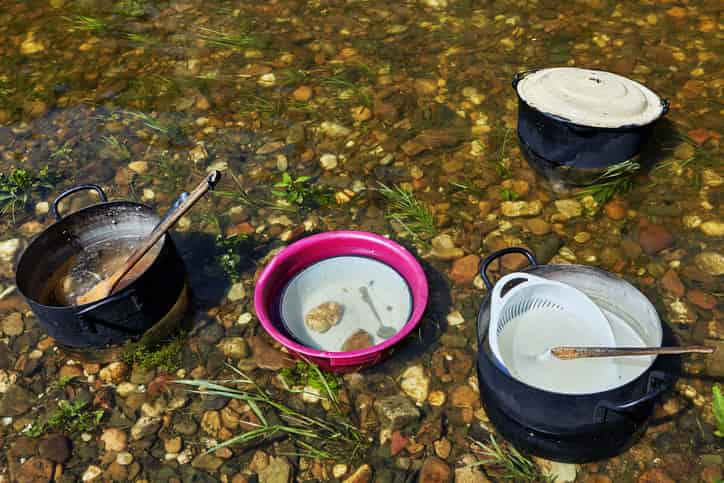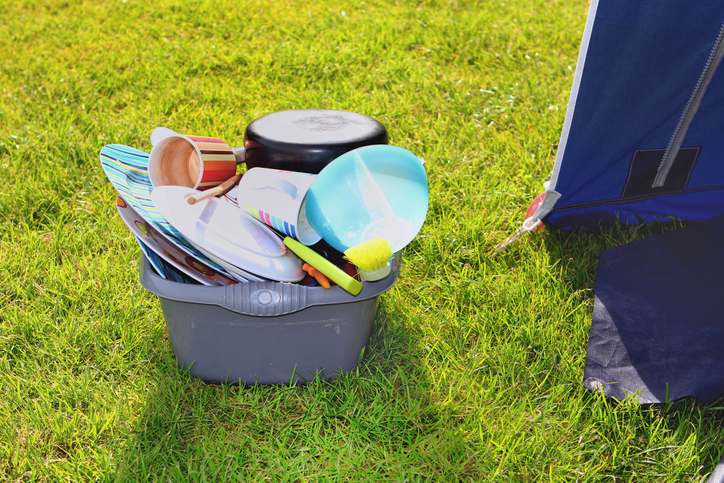We’ve all had those nights at home where we just can’t tackle the dishes after a big dinner. Even when there’s a dishwasher handy, just the menial nature of scraping and rinsing and putting things in the racks can be extremely daunting (and utterly annoying) after a long day.
When camping, though, there really isn’t much of a choice to be had. Leaving dishes dirty around a campsite is just begging for an animal intruder to make a cameo and turn a relaxing camping trip into a spot of chaos.
A good rule of thumb which usually works well is to give the person who cooked a breather while the rest of the camping party tackles the dishes after eating. It’s a fair trade-off and it’s better than one person feeling overwhelmed by having to do everything.
However, doing the dishes while camping is a completely different beast than doing dishes at home. There are a lot more things to consider and a ton of nuances which need to be examined for both the safety of the campers and the sanctity of the environment.
This article is all about dishing on dishes while camping. What’s the best way to wash dishes during a camping trip? What things need to be considered washing dishes both with and without a reliable water supply? We’ll tackle these questions and much more to ensure you’re never the camping slob and always the camping star.
How Do You Wash Dishes When Camping? Well, First…
There are a litany of methods for you to use to wash dishes while camping, but there’s one unifying principle you should always employ when cleaning up after a meal. You should always try to leave as little food as possible and as little of a human footprint as you can on your campsite.
We’ll cover the actual ins and outs of washing your dishes while camping, but you should always approach your cleanup in a way which respects the environment for the beauty and respite it provides. Wash your dishes with your natural heart on your sleeve and make sure you double check everything to ensure you’re not disturbing the natural balance or harming the environment point blank.
It may take a little bit of extra gumption and focus, but it’s worth it when you consider the tranquility and happiness that an unfettered nature experience brings to you and those you love. Respect it and reap the benefits.
What’s The Best Way To Wash Dishes Camping?
The three-bucket method is far and away the most organized and efficacious way to wash dishes while camping. That’s provided there’s enough water available for you to use this method (we’ll show you how to wash dishes without water in just a second).
When packing for your camping trip, make sure you have three plastic bins or collapsible buckets in your gear. Before you get started with the buckets, boil a pot of water. Use some cold water to cut it so you have warm water to use in your buckets. That will make this whole process a lot more pleasant than constantly dunking your hands and arms in ice-cold water.
Your three buckets will serve in the following capacities:
- Wash Sink – Fill this bucket up to quarter capacity with some of the warm water you’ll boiled and cut. Add a few drops of biodegradable (and biodegradable only) detergent. Work from the cleanest dishes to the most soiled to ensure your wash water is as clean as possible throughout the process. After cleaning all the dishes, shake off the excess soap and move on to the next bucket.
- Rinsing Sink – Fill bucket #2 to quarter capacity with warm water as well. Completely submerge your washed dishes in the rinse water to ensure that every bit of soap and detritus has been removed. Finally, move on to your last bucket…
- Sanitation Sink – Fill your last bucket to quarter capacity again and add a bleach-inclusive sanitation agent. Quickly soak your dishes in the sanitation sink to ensure they are disinfected properly and potential bacteria from raw meat and other food items has been eliminated.
You can air dry your dishes if you’re going to be using them soon for your next meal, or you can just keep a clean towel on hand to dry them off quicker for storage.
Now this is all well and good if you have plenty of water to work with, but let’s look at what you need to do if that’s not the case.

How To Clean Dishes While Camping Without Water
If you’re camping at a site where water is at a premium or using water to wash dishes is too risky when it comes to potentially attracting wildlife, there are several different ways that you can clean your dishes and even wash them pretty thoroughly without water on hand.
The most popular (and easiest) method for washing dishes without water requires you have both alcohol-soaked wipes and unscented baby wipes handy in your gear. Firstly, use the unscented baby wipes to wipe down your dishes. Be careful to remove any and all food particles and ball them up for secure disposal out of reach of potential animal visitors.
After you do you initial wipe down with the baby wipes, use the alcohol wipes to do a second run over the dishes. This will remove any excess that may potential have been left and will sanitize the dishes adequately for use during your camping party’s next meal.
Some campers decide to skip the baby wipes altogether and just do a double wipe with alcohol-based wipes. That can work but you can get a much more thorough cleaning done without a water source if you have both on hand.
Keep a bevy of clean cloth or even paper towels in your gear to dry your dishes after they’ve been thoroughly wiped. This will ensure you don’t get some weird alcohol aftertaste when using your dishes later.
What Do You Do With Dishwater When Camping?
Your dishwasher disposal method is going to depend heavily on the amenities available at your campsite. There are a good chunk of modern campsites out there which make things easy by providing a sink or a designated drainage area for dumping dishwater. If you’re lucky enough to be camping at a site which provides such an area, a ton of the legwork will be done for you.
However, let’s assume that there’s no such sink or drain for you to dispose of your dishwater. What then? Well, the number one tool of a trade for properly disposing dirty dishwater at a camping site is a strainer of some sort. Before dumping your dishwater, you want to make sure than any excess food particles and detritus has been strained from it to avoid attracting unwanted animal guests.
After straining your dishwater thoroughly, you need to find a spot that’s at least 200 feet away from your campsite just in case something did remain in the water. Furthermore, dump your dishwater at least 200 feet away from any water sources, trails, or roads in and out of the campsite.

Tips For Cleaning Cookware When Camping
Now that you’ve got cleaning dishes while camping down pat with or without the help of water, you’re ready to learn a few more tricks of the trade which will prove extremely beneficial (and also extremely kind to your campsite).
- Please never use disposable dishware while camping – This is less a tip and more a call to your love of nature. Disposable dishware increases your impact on your environment in ways that could be harmful to both plant life and animal life.
- Bring a large mesh bag to make drip drying super easy – If you’re going to be using your dishes again for your next campsite meal, you can place your dishes in a large mesh bag which has strings at the top of it to close it. Pull it tight and hang the bag from a tree branch to drip dry your dishes in effective fashion.
- Pay attention and don’t burn food when cooking – There’s nothing worse while doing dishes camping than trying to scrape at food that’s been burned into ashy food glue stuck to your pots and pans. Keep your eye on things while cooking and make things easier on yourself.
- Bread is a perfect pre-cleaning tool – Pay your compliments to the chef by using a piece of bread to sop up excess food and sauces from your plate before cleaning. You’ll get a delicious treat and will make it easier to clean the dishes later.
Closing Thoughts
As you may have gleaned from all of this, washing dishes when camping isn’t really even in the same ballpark as washing dishes at home. There’s so much to consider and so many unique factors to take into account to ensure no harm is done to the environs of the campsite.
With these tips in mind and a diligent camping party who cares, you’ll leave a very small footprint at your campsite and will have done good by the beautiful things that surround you. And, you’ll have clean dishes for your next awesome meal. That always helps.
